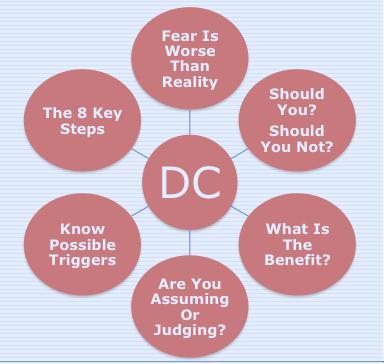Difficult Conversations, Crucial Conversations or Conflict Management Training
Knowing how to address difficult conversations with compassion and a plan for shared success takes only a fraction of the energy it takes to try to ignore it or make excuses for it. Knowing how to have difficult conversations at work means you’ll increase your ability to build trusting relationships, reduce stress and find collaborative solutions.
Bruce offers difficult conversation training in Toronto and across Canada, frequently speaking in Montreal, Kingston, Halifax and Vancouver to help teams prepare to safely express disagreements and/or deliver challenging news. To keep everyone safe during the Covid Pandemic, we have been running the majority of our training online.
Bruce Mayhew Consulting uses real examples to help participants experience new business skills first-hand. We also believe your team can have fun and be motivated while we deliver customized learning experiences.
Plan | Engage | Succeed
“You can trust us to do the job for you.”
Difficult Conversations are not usually steeped in conflict unless those conversations are ignored. As Lou Solomon reports in the Harvard Business Review, two-thirds of managers are uncomfortable communicating with their employees.
Two reasons why difficult conversations are avoided:
FEAR of being attacked back or of disappointing someone.
FEAR of not knowing how to have a respectful difficult conversation where we will feel prepared and able to confidently work through the anticipated needs, emotions and fears of the people we are speaking with.
Conflict management and difficult conversations training builds mutual respect and trust while also strengthening our important relationships.
Difficult Conversations Training & Conflict Management Impact
It's natural to dislike challenging crucial conversations, and yet learning why conflict at work happens, the benefits of resolution and how to have them is part of a well-balanced professional development plan. After our skills training course participants will:
Understand why most of us try to avoid conflict at work and difficult conversations
Know that avoiding conflict usually leads to lack of performance, trust, respect and increased turnover
Build strong communication skills and agree resolving conflict is important
See early signs of conflict as an opportunity - a place where people feel passionate and are demonstrating a level of ownership and concern
Explore how to master your emotions and attack problems — not people
Know how to prepare for a respectful difficult conversation and resolve conflict
Know when having a challenging conversation is the right solution… and when it is not
Know how to provide feedback and constructive evaluation in a productive, supportive way
Explore how Mindfulness helps us stay present and how Emotion Focused Therapy helps us understand our feelings and needs
Be able to resolve conflict face-to-face, by phone and by email
Use proven negotiation strategies to achieve better outcomes and business relationships
Evaluate your priorities - and theirs
Realize how individual beliefs and ego (not logical ideas), often impact conflict management
Be able to give constructive feedback in a non-threatening way
Learn when and how to say No... respectfully
Know how to deal with difficult people when they are angry and/or hostile people
Difficult conversations training is an important part of a professional development plan. Toronto based Bruce Mayhew Consulting teaches participants how to use negotiation and conflict resolution skills that lead to mutually beneficial outcomes and long-term profitable relationships.
But if we do nothing, avoiding confrontation and difficult conversations leads to resentment, lack of trust and loss of motivation. It also means an uncomfortable situation can quickly escalate into serious conflict and crucial conversations.
Our Approach to Difficult Conversations & Conflict Management
Toronto Difficult Conversations training expert and executive coach Bruce Mayhew Consulting provides practical step-by-step solutions supported by real life examples. We explore unique solutions that have great impact like:
How to discuss what matters most.
Why it's best to always consider a personal / emotional resolution.
The top mistakes managers make when having difficult conversations.
Crucial conversations and negotiations are important, that's why we also explore the impact of:
Triggers
Judgment
Assumptions
Fear
Beliefs
Who Should Attend?
Difficult conversations training is for all employees who manage staff, work in collaborative environments and/or who routinely negotiate or deal with difficult people (customers or suppliers). Confidently turn crucial conversations into constructive conversations.
To learn more about how you and your organization can benefit, call us at 416.617.0462.
Related Management Training That Drives Business Success
Bruce Mayhew offers professional development, career training and Difficult Conversations training in Toronto. We also offer training and speak at conferences in New York and throughout Canada and the USA. Bruce Mayhew Consulting's other popular programs are Email Etiquette Training, Generational Differences and Time Management Training.
You are one email away from an interactive, customized solution… or…
give us a call: 416 617 0462.
Bruce Mayhew, Conference Speaker
Customize Your Management Training
Group and One-on-One Training
Keynote / Conference Speaking
Difficult Conversations Training / Crucial Conversations Tips
Training Tip #1
Know what you want to achieve in advance. Be sure to stay positive, listen without judging and don't be defensive. Difficult conversations are emotional and can be stressful for everyone, but it's important we try not to BE emotional during the conversation. We apply Emotion Focused Therapy to help participants understand their feelings and the feelings of their stakeholders.
Training Tip #2
Make sure the timing right. Everyone involved has to be 100% present and not distracted - therefore - make sure you do this (as best you can), when everyone is at their best.
For example - you don't want to have a difficult conversation as your associate is running out the door late for a meeting - or when you and your partner are pulling up to a New Years eve party.
Training Tip #3
Know that it's going to be uncomfortable for you and the other person / people... so, be comfortable with the idea that you will be uncomfortable.
Knowing you are going to feel uncomfortable during a difficult conversation will help you keep your focus and your emotions in check.
Thank you for visiting.
Bruce Mayhew Consulting offers corporate training, keynote speaker presentations and executive coaching in Toronto Ontario, Kingston Ontario, Montréal Quebec and throughout Canada and the USA. Our goal is to go to where employees are most comfortable and to help them acquire new skills and experience. We believe theory becomes experience when you use your new skills within safe career training environments.




